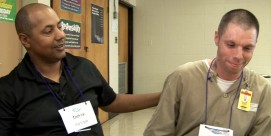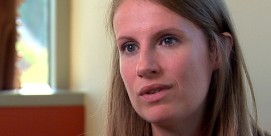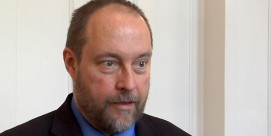KIM LAWTON: We've been talking about how there's a growing faith-based coalition working on some of these issues. I've been interested to see the diversity within that coalition. It's not just liberal churches or African-American churches. Talk a little bit about the coalition that's been forming.
BISHOP DARREN FERGUSON: When I was coming out of prison, out of all the prison ministries that came into Sing-Sing, the church that helped me was a majority white, upper-class church, folks who were more conservative. So it's a coalition amongst people who understand that there's a need, it's a coalition amongst people who understand that it affects their communities directly, and it's a coalition amongst people of faith who say this is just the right thing to do.
LAWTON: And how much pushback is there? I mean, on the political scene, we hear from political conservatives raising some concerns. Do you get that in the faith community as well?
BISHOP FERGUSON: Yes. I mean, in the African-American community, it's because most of the crimes have been committed in their own communities. Of course there's some hesitance. And in the other communities, it's just that these people, because they don't know them, they don't understand other communities, other cultures, so there's some pushback, but I think that the overriding factor in all of this is in our Christianity. We understand we have a duty to be kind to the other, no matter what that other entails.
ABERNETHY: How do you yourself, personally, as you go through your daily, weekly chores, how do you deal with it? How do you help?
BISHOP FERGUSON: Oh, easy. I'm a part of a few coalitions—Faith in New York, Healing Communities, and different things that I do. But also where I work, at Laguardia Community College, I started a program called LEARN, which is an education access reentry network for young men and women who are coming out of prison and into colleges. So I've kind of woven this into every aspect of my life, including my church and my professional life.
ABERNETHY: But you take them on personally, don't you?
BISHOP FERGUSON: Yes.
ABERNETHY: Don't you have a lot of godchildren?
BISHOP FERGUSON: Yes, godchildren who have been either criminal justice-involved or at-risk, men and women who I served time with, who I've gone and picked them up in my car from prisons when they came home, bought them clothes and underwear when they got home, even housed some of them in my wife's apartment so that they could have a place to live. I mean, anything I can do because I know that I'm living on the fact that somebody cared for me when I got out. The guys who got out before me helped me when I got out. People who are doing this work helped me, so I'm bound to reciprocate.
ABERNETHY: And how do you convince a normal congregation that this is something that they should do? That is a hard thing to do.
BISHOP FERGUSON: Yeah. I think it's scriptural, being theologically sound. It's passion. And it's being able to see the fruits of their labor. When I come in and talk to somebody, people don't realize that I did 9 years. They think that I'm some well-meaning pastor who's just taking on this work. But when I tell people my story and tell people my history and show how people have helped me along the continuum, then people say he is the possibility of the work we're doing now.







